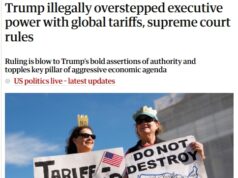There is the old point of confrontation (the issue of impeachment) and the new, or newly escalated (inciting hate crimes). How will all this play out?
The issue of impeachment has been gathering steam of late, with the House Judiciary Committee filing court documents that explicitly state that they are working to decide on whether to bring Articles of Impeachment, and with a majority of the Democrats in the House now publicly calling for an impeachment inquiry.
All that makes it appear probable that, at last, the Democrats in the House will be taking strong action, in the coming months, to expose Trump’s criminality, corruption, and betrayal of the nation to the American people.
But meanwhile, in the past two or three weeks, a confluence of events have brought a long-standing issue concerning Donald Trump — his stoking racial hatred and violence — to a whole new level of intensity, flaring up so starkly that it has lately taken over the national conversation:
The first part of this confluence of events was Trump’s blatant escalation of his racist rhetoric, in attacking women of color who are members of Congress, and then also Elijah Cummings, Chair of the House Oversight Committee. “Go back to where you came from” crossed a line, for many people. And it moved the House to pass a measure rebuking the President for his hate-filled racist rhetoric– rhetorical which, it seemed clear, was the heart of his whole political strategy for his re-election campaign.
It was in the context of that already intense political battle over racism and divisiveness — between an ever-uglier President Trump and an ever-more outraged denunciation of that President by his critics — that a murderous assault in El Paso made that dimension of the Trump Crisis the focus of our national conversation.
That shooting has turned out to be more than just another mass-killing that highlights the madness of the nation’s failure to protect public safety with sensible gun laws. The usual outrage over gun violence got multiplied by the already boiling issue of presidential hate-mongering.
The two together displayed to the nation the deeply dark spirit behind Trump’s brand of “leadership.”
The rhetoric in the manifesto of the El Paso shooter drew directly from Trump’s racist attacks. And it demonstrated — not just theoretically — how leadership that foments hatred and division leads to violence. It made visible how, when we have a leader who plays with this kind of fire, there will be followers who will set the nation ablaze.
While this has been clear for a long time — the Pittsburgh synagogue shooter, and the pipe-bomb mailer, two give but two examples, both explicitly saw themselves as acting on the messages they’d received from President Trump — it is this immediate confluence of events that have brought the national awareness of the Trump Crisis to what seems like a new level.
(Whether this is a temporary blip that will revert to the old level as events recede into the past, and new things grab public attention, or whether it will prove a tipping point remains to be seen.)
One question that interests me is whether Trump’s hate-speech crisis will have an impact on that other battlefield– i.e. whether the intensification of the issue of Trump’s fanning of racist hostilities and hate-crimes will increase or decrease the force behind the impeachment effort.
I can imagine it going either way.
On the one hand, so long as the hate crime issue is boiling, I can imagine it diverting attention and energy away from impeachment: If people are thinking about Trump’s despicable rhetoric, according to this scenario, they’ll not have attention and passion left over for caring about Trump’s criminality.
But on the other hand, I can imagine that anything that increases the popular feeling against Trump’s presidency will also increase the desire of the public to condemn him for any other cause.
And it does seem that Trump’s racist political strategy has lately proved counter-productive for his purposes. While there are of course many racists, they are not a majority. And polls have shown that large majorities have disapproved of Trump’s racist attacks on congresswomen of color– even before the recent hate-crime multiple murders in El Paso.
The Republican Party has harnessed racism since Nixon’s “Southern strategy” a half century ago. But that Republican appeal to racism has often been coded– giving voters a kind of “plausible deniability” to themselves about the extent to which their own racist feelings were motivating their political allegiance.
Trump’s increasingly “audible” racism — going beyond the “dog whistle” — eliminates that plausible deniability. And if Trump thus alienates suburban (previously GOP) voters, and independents, with his all-too-blatant racism, his political standing with the overall electorate, and his prospects for 2020, could erode.
(I’d predict that the polling will show a measurable, if not large, drop in Trump’s public support in the next week or two. In addition, in terms of the 2020 election, the intensification of the issue of Trump’s menacing of Hispanic people seems to promise that turn-out of Hispanic voters in 2020 will be high, given what one might assume will be the widespread recognition among that part of the electorate of the stakes in denying Trump a second term.)
My guess is that the more disgust for Trump there is in the American public — for any reason — I’m saying, the more open they will be to striking at him for other reasons, like for his “high crimes and misdemeanors.” Which would mean that — to the extent that this hate-rhetoric issue continues to flare — the public support for impeachment will likewise be bolstered.



![[UPDATED] Leaders Jeffries, Schumer Announce Gov. Abigail Spanberger Will Deliver the Democratic Response to Trump’s State of the Union Address on 2/24](https://bluevirginia.us/wp-content/uploads/2026/02/spanbergersotu-238x178.jpg)








![Saturday News: “Ukraine is the biggest and most consequential of all the American betrayals”; “Get Ready for Zombie Tariffs”; Murdoch’s WSJ – “Trump Demeans Himself as He Attacks the Supreme Court”; “Virginia House Delays Action on Bill Banning [Lethal Pesticide] Paraquat”](https://bluevirginia.us/wp-content/uploads/2026/02/montage0221-100x75.jpg)